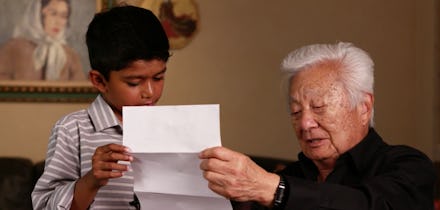Watch Muslim-American Children Read Letters From WWII's Japanese-American Internees

In his new short film, Frank Chi confronts the racist ideologies born out of certain American eras. In this day and age, it's the rampant islamophobia promoted by figures such as Donald Trump and misinterpretations of recent extremist violence.
In the powerful two minute-long video created in partnership with the Smithsonian Asian Pacific American Center, six pairs of Muslim-American children and Japanese-American internment camp survivors read letters written by children who lived in the camps during World War II.
"My film aims to remind Americans in this high-stakes moment of that dark past so we can learn from it," Chi wrote in the Washington Post.
The filmmaker stressed the consequences that racism can have on children in particular.
"When hate overtakes our debates, it's children who suffer the most," he wrote. "It's when they're taught at an early age that the American promise might not include them."
The last letter, written by Louise Ogawa, offers some of the most powerful evidence of that. "We all know that there are people all over the world who hate certain races and just can't help it," Ogawa, who was 11 at the time, wrote. "But I'm sure when this war is over, there will be no racial discrimination, and we won't have to doubt for a minute the great principles of democracy."
In the video, the internment camp survivor chokes up as she reads part of the letter.
During WWII, the United States government abruptly relocated 110,000 people of Japanese heritage into remote internment camps after the attacks on Pearl Harbor incited the spread of anti-Japanese sentiment across the country.
Life in the camps was bleak: People had to wait in lines to do anything, from eating to using the bathroom and they lived day-to-day cooped up behind barbed wire. The final camp didn't shutter its doors until 1946.
In November, Roanoke, Virginia mayor David Bowers compared the controversial refusal of Syrian refugees to the Japanese internment camps:
"I can't believe that I'm having to point this out, but most people today — most historians, most respected students of history — would say the internment of Japanese-Americans was a mistake and it's not a model on which to base policy today," he told the Los Angeles Times.
Read more: 7 Incidents That Prove Islamophobia Is Alive and Well in the US and Canada